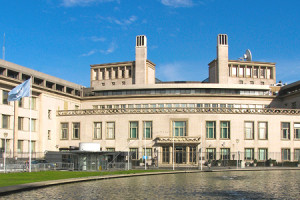 Radovan Karadžić, the war-time President of Republika Srpska in Bosnia and Herzegovina has been convicted and sentenced to 40 years in prison by the United Nations International Criminal Tribunal for the Former Yugoslavia (ICTY) today.
Radovan Karadžić, the war-time President of Republika Srpska in Bosnia and Herzegovina has been convicted and sentenced to 40 years in prison by the United Nations International Criminal Tribunal for the Former Yugoslavia (ICTY) today.
Karadžić, the ‘Butcher of Bosnia’, was charged with responsibility for atrocities including the siege of Sarajevo and the 1995 massacre of 8,000 Muslim men in the Srebrenica enclave.
The Yugoslav Court, sitting in The Hague, found Karadžić guilty in 10 of 11 counts, including genocide, crimes against humanity (in the form of persecution, extermination, murder, deportation, and inhumane acts) and violations of the laws and customs of war (including murder, terror, unlawful attacks on civilians and taking of hostages).
Presiding Judge O-Gon Kwon found that Karadžić had been responsible for genocide in Srebrenica, where close to 8,000 Bosnian Muslim men and boys were murdered in 1995, on the basis of his membership in a Joint Criminal Enterprise (JCE), but not in other Bosnian municipalities. He was further convicted of persecution, extermination, deportation, forcible transfer and murder in connection with a campaign to drive Bosnian Muslims and Croats out of villages claimed by Serb forces during the country’s 1992-1995 civil war.
Karadžić, currently 70 years, was sentenced to 40 years’ imprisonment, while receiving credit for the time already spent in detention (8 years).
Radovan Karadžić was a founding member of the Serbian Democratic Party of Bosnia and Herzegovina. He was President of the party from July 1990 to July 1996. He acted as Chairman of the National Security Council of the so-called Serbian Republic of Bosnia and Herzegovina (later Republika Srpska). He was President of the three-member Presidency of Republika Srpska from its creation in May 1992 until December 1992, and thereafter sole President of Republika Srpska and Supreme Commander of its armed forces until July 1996.
The verdict has been labelled as the most important moment in the 23-year existence of the ICTY. Ilawyer Dr. Guénaël Mettraux called the process exemplary in that it has demonstrated the ability of the international community to prosecute crimes of such magnitude while guaranteeing the fundamental rights of the accused. Continue reading →
 Today, Radovan Karadzic has filed an appeal to the UN’s Mechanism for International Criminal Tribunals against his conviction by the International Criminal Tribunal for the former Yugoslavia (ICTY) in March this year.
Today, Radovan Karadzic has filed an appeal to the UN’s Mechanism for International Criminal Tribunals against his conviction by the International Criminal Tribunal for the former Yugoslavia (ICTY) in March this year.

